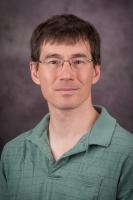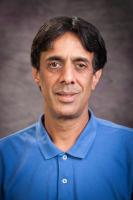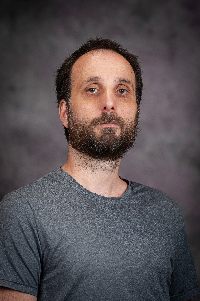NSF REU at K-State: Interactions of Matter, Light and Learning
The K-State REU program offers summer fellowships to do world-class research in our friendly physics department in the scenic Flinthills. We are funded by the National Science Foundation.
Elementary Particle Physics and Cosmology
 Dr. Glenn Horton-Smith and Dr. Tim Bolton: High Intensity Elementary Particle Physics
Dr. Glenn Horton-Smith and Dr. Tim Bolton: High Intensity Elementary Particle Physics
Email: gahs@phys.ksu.edu or bolton@phys.k-state.edu
Physics at its heart is the study of the properties and interactions of matter, energy, space, and time. A primary focus of the K-State high energy physics group's research is on using high intensity particle beams and specialized particle detectors at Fermilab to search for "new physics". By "new physics", we mean fundamental interactions and properties that have not yet been discovered. We have a strong and active effort in neutrino experiments including MicroBooNE, and we are initiating a program in new physics searches at Mu2e. K-State will be working on software and hardware for monitoring and controlling the Mu2e experiment. There may also be opportunity to work on testing parts of the cosmic ray veto system. This is an excellent opportunity for an REU student to gain experience in programming for real-world data collection and device control, as well as testing and data analysis.
 Previous computer programming experience, while helpful, is not required.
Previous computer programming experience, while helpful, is not required.
 Dr. Bharat Ratra: Rotation curve of the Milky Way galaxy
Dr. Bharat Ratra: Rotation curve of the Milky Way galaxy
Email: ratra@phys.ksu.edu
Use statistical methods (including weighted mean, median statistics, and truncation) to synthesize the Milky Way galaxy rotation curve by combining many different stellar velocity measurements. Also check consistency between different measurements by examining the gaussianity of the error distribution.
You will learn about the rotation of the Milky Way and luminous and dark matter, as well as some statistical and computational techniques.
Daily activities will include learning and/or improving programming techniques and plotting.
The more programming experience the better, but none required, just need an interest in learning it.
 Dr. Lado Samushia: Cosmology
Dr. Lado Samushia: Cosmology
Email: lado@phys.ksu.edu
Over last few decades cosmology has become a data driven science. We have lots of data coming from astrophysical observations of exploding supernovae,
background radiation, and distribution of millions of galaxies in space. We use these data to study the properties of the Universe such as, the nature of dark
energy, the strength of gravitational interactions, the distribution of dark matter in the Universe, etc.
Theoretical physicists have proposed various models of how dark energy and gravity work. These models, if correct, have parameters whose numerical values
are currently not known very well (for example, the equation of state of dark energy or the coefficient of screening for gravity). The goal is to see which
models are more likely to be true given the data, and for those models to estimate the numerical values of their parameters.
We usually do this by explicitly looking for predictions of all the models, for various numerical values of parameters, and checking which ones are more
compatible with the real data. This process can be really time-consuming, but there are ways of speeding it up by employing a Markov Chain Monte Carlo method.
I have ideas of how to make the process of finding the most likely model (and the parameter values) extremely fast for some limiting cases. The student would
work on improving, implementing and testing this method on cosmological datasets. The project will require a combination of computational skills (writing a computer code) and problem solving skills. Even though at least a rudimentary knowledge of computer programming would be beneficial, it's not a requirement as long as the student is willing to learn and acquire those skills during the project.
The student will have an opportunity to learn more about cosmology and acquire skills in computer programming, applied statistics, and data analysis. These
skills are useful in all scientific disciplines as well as industry. If you like the project but aren't sure if it is suited for you don't hesitate to get in touch with me at lado@phys.ksu.edu.